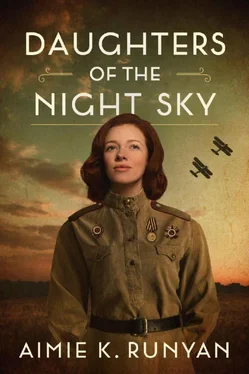Oksana chuckled. “I don’t know how much of that will be necessary. They forwarded his uniform to me this morning. If he doesn’t find the dress becoming, the panties will do the trick.”
December 1944, Poland, Sorties: 794
We’d enjoyed a quiet December in Poland and could smell the sweet tang of victory in the air like the seductive scent of fresh bread wafting out the bakery door. I held a parcel in my hands from Vanya. It had been weeks since his last postcard. I couldn’t let my thoughts drift over to the dark places and at the same time maintain the courage to fly, so I invented reasons for the lack of communication to distract myself. Lost sacks of mail—plausible. Too much time enjoying the camaraderie of his fellow pilots—somewhat less so. Far too much work and very little leisure—probable. I couldn’t contemplate anything more dire.
But here in my hands was an actual parcel from him. The only one I’d received during the war. A small canvas, not larger than a child’s school slate, was coiled up and packed carefully in a leather tube that might have been suited for blueprints or important documents. I unfurled it to find a small but intricately rendered portrait of myself. Every line in my face, the curve of my nose, the shade of my hair, all re-created from his perfect memory. He couldn’t have devoted many hours to it—I knew what his life was like on the front—but there wasn’t a brushstroke out of place. Seeing each of my features assembled on the canvas, this time without any benevolence of young love perfecting the flaws, I felt a moment of breathlessness as my heart strained against my ribs.
“Your husband is quite the artist,” Oksana observed, peering over my shoulder.
I cleared my throat, grateful that her intrusion had interrupted the torrent of tears that would have erupted. “Yes,” I said once I’d collected myself. “A fine one.”
“He managed to capture the shade of your hair. That’s quite a feat. It really is lovely.” She took one of my tendrils between her thumb and forefinger and dropped it, as though the red locks were as hot as the flames they resembled.
“Thank you,” I said, pretending I hadn’t noticed her gesture. “I hated it as a girl and was annoyed by it when I was at the academy. I hated anything that called attention to me. I envied Taisiya her mousy hair.” The mention of Taisiya still caused my voice to crack slightly. I still started when I saw one of Oksana’s blond locks fall loose from her helmet instead of Taisiya’s mousy brown when I was in the rear cockpit.
“My friend Yana enjoyed drawing. She never had money for paints. Or lessons. She made do with pencils or charcoals and her own imagination. She hasn’t your Vanya’s skill, but I think she has talent.”
She fished a large volume from her trunk and removed a loose paper. On the front was a skillfully drawn portrait of Oksana. She was in a field of white-and-blue striped snowdrops, just as Oksana had painted around our cockpits months ago. Oksana’s face was soft, kinder than I saw it, but then Yana had the privilege of knowing Oksana before the war had claimed her to service. There were no lines of worry around her eyes, and her lips turned upward in a graceful smile.
“She does. She should go to art school after the war. I’m sure there would be a good conservatory for her in Moscow, once things settle down. I have a feeling there will be a great demand for beautiful things to help us all forget the vile ones we’ve endured.” I had created a fantasy life for myself in the past few months: Whisking Vanya away to the cabin in Miass and spending six months cooking all his favorite foods while he sat in the fields and painted. Wildflowers in summer. Leaves in autumn. Even the austere, spindly branches weighted down with snow as winter took hold. I might even allow him to paint me en déshabillé, as he’d mentioned on our wedding night. I could see every wall covered with his landscapes, masking the scarred wood with his beautiful creations. We would take months to heal, to be ensconced in one another, before setting about rebuilding our lives.
“I want to take her to Aix-en-Provence,” Oksana said in a low voice. “I have family there, and they sent my father the fare for our train tickets once as a special treat. Three weeks there and I’ve never been able to tolerate the cold like a proper northerner ever since. The light there is remarkable. Painters flock to it. It would be bliss for her.”
“That does sound lovely,” I said, studying Oksana’s face. She looked far away, wistful. She looked in my direction, but I felt her gaze glance past my face and to the barracks beyond me.
“It’s not too far from Aix to the ocean. We stayed a few days at Saint-Cyr-sur-Mer. My aunt said we couldn’t come all that way without putting our feet in the Mediterranean.” She folded a uniform shirt and placed it in her trunk, smoothing her blanket before sitting and looking at Yana’s drawing once again.
“She was right,” I said, placing the tube with Vanya’s painting in my duffel. “Mama always dreamed of the Riviera. And Italy. Spain. She always wanted to travel, at least before Papa was killed. It’s why I decided to fly. I wanted to take her to see all those places since Papa never did.”
“How sweet of you,” Oksana said. “I’ve always wanted to go back to Aix. I cried for three weeks when we left. But heaven knows there will be enough work putting the country back together once this is all over. There won’t be any time for holidays by the sea for years yet.”
It was the first time Oksana had mentioned life after the war, the first glimmer of optimism I’d ever seen from her. I hid my smile, not wanting to stifle the ray of sunshine when they were so rare. The signs of hope were springing up in more than one quarter. The army was even willing to let us carry parachutes, sacrificing a few kilos that could have been used for bombs. They expected some of us would live.
“Take her there,” I said. “When the cease-fire sounds, we will have done our part. We can leave the rebuilding up to others. Those with more energy left than us.”
Oksana shoved the drawing back in her book and placed it back in her footlocker, forcefully but carefully.
“Dreams are for later, Katya.”
Taking off with the benefit of a proper runway was a luxury I could well become accustomed to. The wooded terrain in Poland was far easier to maneuver over than the peninsulas and mountains in the south, with their erratic winds, but we’d traded in the hospitality of farmers’ homes and makeshift barracks in abandoned schools for tents and trenches. We might have complained about the dismal conditions in Poland, but we barely had time to sleep, let alone consider our discomfort. The canvas of our tents flapped angrily in the winter winds like geese who had waited too long to migrate. The tents did little to shelter us from the cold of the Polish morning, but it was better than the days we had to sleep outdoors.
We hadn’t run at our full effort in a few weeks, but we’d been ordered to harass a German camp just to the west of the front. No specific targets in mind—we were just to keep them awake, make a mess of their camp, and encourage them to move westward back toward Germany. We’d made progress over the last few months, and the Germans were getting more and more desperate. We rarely got a close look at the enemy troops, except when they made the occasional raid of our camps, but the faces we saw were getting both older and younger—old men and little boys. Men of proper fighting age were becoming scarce in Germany. When we saw the faces of our own troops, I saw much the same phenomenon, though to a lesser extent. If we had an advantage over them, it was the size of our country and our sheer numbers.
Читать дальше













